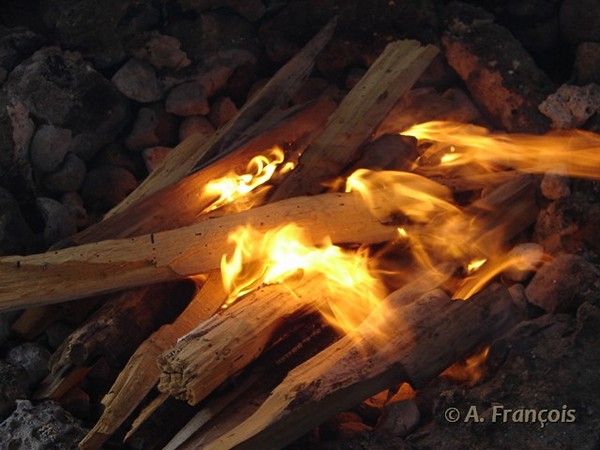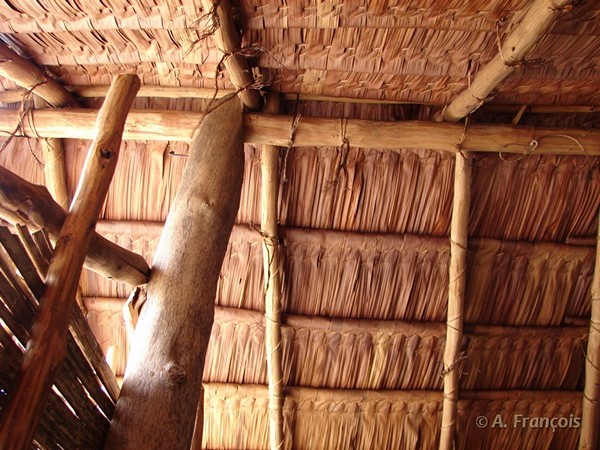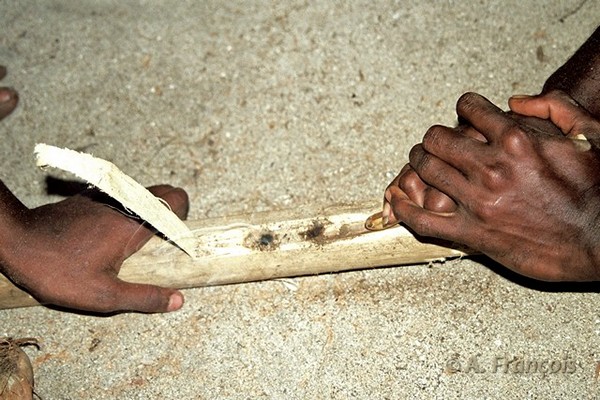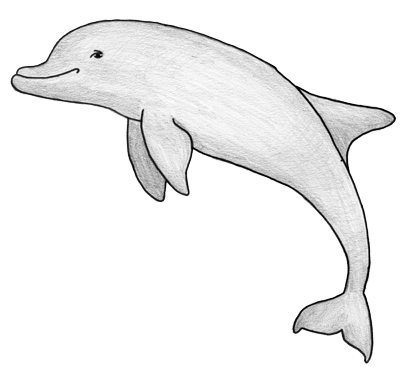~i1 (i·)i verb, intransitive
call out with high-pitched voice, typic. in order to reach out to a distant or invisible person in the bush
| Ni-le ne ngogoro n-i, ia ni-lengi ngele i-laiaini tae.As I was walking in the forest, I called out, but I heard nobody reply. |
Grammar
1 – Realis prefix for 3rd singular subject of verbs
| I-aiae mijaka.It's a bit difficult. |
seeini
ia1 ja interjection
exclamatory particle used when handing s.th. to s.o.: ‘here you are’
| Ia! Okor' ono!Here you are! This is your knife. |
~ia3 (i·)ja verb, transitive
~ia4 (i·)ja verb, transitive
remove ‹guts of fish+›
| U-do ngava, awoiu u-ia bea mina.You scrape off the scales, and then gut it [lit. remove its guts]. |
Grammar
1 – their: form of the general possessive classifier (enone*), with a 3 plural possessor (see dapa)
| Li-wowo ñe viko iadapa.They swam with their treasures. |
| I-te tev' ai' iape me et' iape ne moe iadapa.He lives with his parents, in their house. |
2 – + NP modifier‘of those…’, ‘of the…’
| aero iadapa Teanu+locativethe territory of the Teanu tribe |
| toñaki iadapa Franisithe ship of the Frenchmen |
| makone iadapa tadoedance of the spirits |
| Pon teliki iadapa pe li-maluo, ka Teliki Makumoso iadapa po li-bu.+relative clauseThere are chiefs for those who live; but the Supreme Lord for those who are dead. |
Cf. ae ① ‘what’
interjection expressing disdain, similar to shrugging
| Tae, ponu ajekele, iae!Leave that, that's the rubbish! Yuck! |
Anoun
Cf. ero ① ‘water’
river
| Ni-lebie ne iaero.I bathed in the river. |
| ne pwama iaeroon the river bank |
| al’ ero ne iaerothe river mouth [lit. foot] |
see lexical list atero ①
~iaibi (i·)jaiᵐbi verb, transitive
mix together ‹ingredients›
| Li-iaibi samame ero.You mix (it) with water. |
iaidi jaiⁿdi possessive classifier
Grammar
1 – people's: form of the general possessive classifier (enone*), with an impersonal possessor (idi ‘people, one’)
| Noma li-lanasu idi ne ngatene engaenga: ebele nga namolo iaidi, viabasa idi, kula none aidi, viñe buioe aidi.In the olden days, killing someone could be done using a variety of objects, such as their clothes, their hair, the food they left, the nut they chewed… |
seeaidi
Cf. ini ‘it/him/her’
Grammar
our, i.e. of you and us: form of the general possessive classifier (enone*), with a 1st inclusive plural possessor (kiapa)
| teliki iakapa na pe ka i-re kiapa naour leader who has left us today |
| Na kuo iakapa tae! Na bwara kuo ie damala.That is not one of our ships. That must be a ship of Westerners. |
seeakapa

POc*api
Words of fire ✧ iawo
| iawo | fire |
| longe | firewood |
| awene | stone oven* |
| kangele iawo | flames |
| vangana | glow ‹of fire› |
| pana | heat |
| ~maili ② ; ~maliawo | light a fire |
| ~ia ③▻② | light ‹fire› by rubbing |
| ~vongo | burn, be burnt |
| ~bi ② | fan ‹fire› |
| ~su ① | set fire, burn ‹s.th.› |
| ~tau | cook ‹s.th.› |
| kaiawo | smoke |
| beniawo | ashes |
| viomoro | charcoal in fireplace |
| uro | charcoal; soot |
fire
| Li-ia iawo ñe vilo.We light fire with (pieces of) wood. |
| Telau i-avo boso iawo.The food basket is hanging above the fire. |
| Moe enone i-vongo ne iawo.My house perished in the fire. |
Apersonal pronoun
Forms of the generic pronoun ✧ idi
| idi | free pronoun |
| li-▻③ | subject pfx, realis |
| le- ③▻③ | subject pfx, irrealis |
| iaidi | possessive, general |
| aidi ① | possessive, food/tool |
| aidi ② | possessive, kin |
1 – ‘people’, ‘one’, ‘they’: 3rd plural impersonal pronoun for human referents
| Program kula idi li-la moli.subjectSome software programs are free [lit. people give them unconstrained]. |
| Tamate li-romo wako, ia idi li-madau.The dancing masks were beautiful, but scary. [lit. but one feared them] |
| U-labu idi motoro!objectBe respectful to people! |
| Tongolukilo ponu wako peini basa idi i-meli.possessor of inalienable nounThis medicinal plant is useful against headaches. |
| Ka telepakau pe na, lek’ iaidi, idi pe li-romo idi tae. Kape le-wamu idi ñe idi.reciprocal constructionIn our culture, cousins must not look at each other. They must hide from each other. |
Synt.The impersonal pronoun idi construes an indefinite or generic human referent, with low or no individuation (cf. Fr. ‘on’). Among other functions, it may serve to background the agent of an event in a way similar to the passive voice of English.
synonymdapa ⓐ▻②
2 – esplexical meaninghumans, as opp. to spirits or animals
| Puro, li-ejau ñe die idi.War arrows are made using human bones. |
| Dapa Niteni li-ovei pe li-e idi.People from Nendö are cannibals. [they can eat people] |
| Dapa tadoe li-ejau idi li-madau, tamwase ne bwogo.Ghosts scare people, particularly at night. |
| Teliki Makumoso, ai’ akapa, i-waivo idi ñe telepakau, ñe piene, i-waivo idi ñe ngatene pe li-ajau…Our Elderly Lord, our father, he's the one who taught us (humans) our culture, our language, everything we do… |
synonymmwaliko ⓐ
idi abia iⁿdi.aᵐbia noun

iepiene jepiene noun
Cf. piene ‘speech’
tale, story, legend; esp. customary story from the oral tradition
| Bwara le-ko le-watebo iepiene teve uña dapa wopine.We should rather enquire about those traditional stories from the elders. |
| I-si buka iote ñe uña iepiene peini kulumoe iakapa.He wrote a book with several stories from our country. |
| N-atevo iepiene amjaka peini Laperus. Iepiene pon na, ni-lengi tev' et' one.I'll tell a short story about Lapérouse. This story, I heard it from my mother. |
| Li-bei bete pon, li-atevo iepiene pe noma, li-oburo, li-vongo ka li-mokoiu.During funeral ceremonies, we tell old stories, we sing, we eat, and then we go to sleep. |
Anatomy
man, animaltooth, teeth
| Ije ene i-makoe.I have a broken tooth. |
| Poi ponu, ije ka i-ke biouro ka i-velei i-vene.This pig has had its teeth grow long, and bend upwards. |
ilo ilo noun
ilo we uvilo noun
Terminalia for ratsvariety of Terminalia not suitable for consumptionTerminalia littoralis.
~maluo ② ‘live’
s.o.behaviour; general attitude, character
| Awa ene i-viaene imaluo iape.I like her character. |
synonymmaluo ①
| Ini i-lebie men’ iape.She's bathing her child. |
| In’ ne me in’ re, da menuko.This man here, and that one there, they are friends. |
2 – he/she/it: subject of non-verbal predicates
| Momoso iono, ini bworobworo, we koro?Your wife, is she black or white? |
| Jeboro ini tongolukilo iote.Wild basil (it) is a medicinal plant. |
3 – him/her/it: object of verb or preposition
| Ai’ one i-ovei piene Tetevo ka ni-ko u-vagasi ini pon ta.My father knows the language of Utupua, I suggest you contact him. |
Phraseol.A 3rd singular anaphoric object is sometimes expressed by ini, but most often is left implicit (zero anaphora). This is especially true for inanimate referents: ‘I saw it’ would be Ka ni-romo. (rather than ?Ka ni-romo ini.)
4 – after directly possessed nounhis/her/its: possessive after directly possessed noun (e.g. body parts)
| enga inihis/her name |
| Awa ini i-viane.[his neck/mind hits it] He wants it. |
| Die ini i-meli.[Her back hurts.] She's having labour contractions. |
seeiape
Grammar
your: form of the general possessive classifier (enone*), with a 2 singular possessor (see eo)
| eo ka uña damiliko ionoyou and your children |
| Piene iono vengela tamwase.Your explanations are extremely clear. |
| Ebieve iono tivi? – Uluko tamana teva.[lit. How many are your years?] How old are you? – Fourteen. |
Aadjective
1 – other, different
| Et’ adapa pon “Takulalevioe”. Enga ini iote li-ko “Takole”.Their mother was called Takulalefioe. She also had another name, Takole. |
| Tae, ini tae. Iote teve.predicateNo, it's not her. It's someone else. [lit. another one from her] |
Bquantifier
Grammar
1 – a, one: determiner for indefinite singular
| I-si buka iote ñe uña iepiene peini kulumoe iakapa.He wrote a book with several stories from our country. |
| Pi-ko me p-ajau toñaki iote.We want to build a boat. |
Cnoun
head of NP, somet. foll. by modifiersthe one
| Moe iaba pwo; iote iu, ie mwaliko iote.Our house is located below; as for the one above, it belongs to someone else. |
| Iote pe eo a-vete ponu, i-wene ne moe 'none.+ relative clauseThe one you were mentioning is in my home. |
3sise ini
Anatomy
vulgpenis
| Ise eo enaka!from a woman to a manI want your sex! |
| Ise ene i-to!I have a boner! |
up, above
| ne otovo iuup in the thatched roof |
| Moe iaba pwo; iote iu, ie mwaliko iote.storey houseOur flat is located below; as for the one above, it belongs to someone else. |
| basa re po i-wen' iu rethat mountain up over there |
| Ai-ava iu ñe vakaboro?Did you fly (in the sky) in a plane? |
| Li-romo i-katau vangana kanmoro iu ne meteliko.We watch the light of the stars up in the sky. |
1 – bury ‹s.th., s.o.› in the ground
| Viko iadapa li-iu.They buried their shellmoney in the ground. |
| Li-iu tepapa i-le awoiu, li-vesu bulateno i-vio.First they buried the dancing boards, then they erected the ritual pole. |
| Nga mwaliko i-bu, le-iu ebele ini i-wene ne kie ini.When somebody dies, their body is buried in a grave. |
~iu3 (i·)ju verb, transitive
thread ‹several things› using a string or thread
| Dapa Iura li-la vesevelae li-iu me viko.People in Vanuatu thread cone shells into shellmoney. |
1 – push forward ‹s.th. heavy›
| U-iui i-le!Push it forward! |
| Katae kape le-iui kuo i-abu ne revo.They were about to push their canoe out to sea. |
| Dapa li-ioi tovokowo ene: kuo pine ponu i-atili i-abu i-le.As they pushed the lever, the large ship slid down all the way. |
2 – throw, cast, cast away
| Kape le-loko ajekele le-iui ne revo.They're going to gather rubbish and throw it into the sea. |
synonym~laiui
3 – espcast ‹arrow›, shoot
| Pe li-wete telupe, u-avi visone ka u-iui diro i-le i-wete ini.When you hunt pigeons, you bend your bow, and let the arrow fly and hit it. |
synonym~ago
iula jula
Anumeral
1 – when counting or measuringone
| Ni-nabe jokoro lea iune ka kula.I measured the bamboo to be one fathom and a half. |
| uie kwate tamana iunepage thirty one |
| rea iune tamana iuneone hundred and one |
see lexical list attivi
3 – rareindefinite valuea, an
| Emele iune, ini da men’ iape, la-te ne kulumoe.[There was once] one woman, with her child, who were living in the village. |
Phraseol.A new singular referent is normally introduced using the ordinary indefinite determiner iote ⓑ ‘a, an’.
5 – a single; one and the same
| Vesepiene iune, i-vete ngatene tilu.It is the same word, but with two distinct meanings. |
iune na phrase
only one
| Ia enon' iot' tae! Pe enone na iune na.But I don't have another (knife). This is my only one. |
| Mwaliko iune na ka i-te.There's only one man left (who can speak the language). |
iune iune phrase
repetition of iune
one oneone after the other; each and every one
| Kape li-au, li-ngago iunubo iune iune ñe veve.They will wrap [the food], and fasten every parcel using rope. |
Bpostverb
together
| Dapa Lovoko na li-ovei pe li-la ngatene iune.The Lovoko people are used to cooperating with each other [lit. working as-one] |
| ~le iune (be, do) the same; (go) together |
1 – portion ‹of food›
| iunubo vongorobasketful of almonds |
| Kape li-katei vekai iunubo apilaka.They cut the pudding into small portions. |
| Mata da i-koie ponu, la-romo iunubo vekai, iunubo poi, i-wene ne lema Toplau.They looked inside, and saw portions of pudding and portions of pork, set out inside the Men's house. |
Grammar
our, i.e. of me and them: form of the general possessive classifier (enone*), with a 1 exclusive plural possessor (see kupa)
| Makone peini basakulumoe iupa na.It’s a dance from our country. |
| Basa iupa re po i-wen’ iu re, enga ini Popokia.That mountain of ours up over there is called Popokia. |
| Apono i-somoli otovo peini mwoe iupa.The hurricane damaged the roof of our house. |
| dapa iupa nomaour ancestors |
Alocative
iu ‘above’
2 – geocentric coordinatesup on the cardinal axis: towards southeast, south or east
| Ngiro Palapu i-ka ka li-aiu li-ke li-pwalau i-le iura.As soon as the northern wind began to blow, they left [Vanikoro] and set off to sail southwards. |
| Vana uña toñaki i-ka i-loko dapa ne kulumoe na, dapa li-lui li-langatene ne Iura, Santo.Ships used to come to this island to collect people, and then take them away to make them work somewhere in the south, on (Espiritu) Santo. |
BplacenameIura
Geo
hencethe Vanuatu archipelago, located south of Vanikoro; partic. the Torres and Banks Islands, in northern Vanuatu
| Kulumoe Iura, kulumoe i-wene tev’ iu.The islands of (north) Vanuatu are located southeast. |
| Li-ovei pe li-pwalau li-le Iura ne tepuke.They used to travel to (north) Vanuatu on their canoes. |
iuro juro noun
iutego juteᵑgo noun

Architecture
forked pillar standing in each corner of the house, holding the framing of the roof
📘 This pillar holds more weight than the secondary digo ‘vertical post’.
iutego peini tokoli noun
Architecture
pillars for floorstilts, supporting the floor structure (tokoli) in a stilt house
| iutego kuledi peini tokolishorter stilts for the floor structure |
1 – main predicatewhat happens? what's up? how's things?
| Eo pon, ive?[lit. as for you, how's things?] What's up with you? |
| Aia kape i-ka ne! – Ka ive?Your father's coming! – So what?! |
2 – in hesitationwhat? Used when the speaker looks for his words to describe a whole event
| A-ko ive?What did you say? |
3 – foll. another verb(be) why?
| A-kai lusa ene na (pe) ive?But why did you tear my shirt? |
pe ive? interrogative
clause-finalbecause it's why?why?
| Eo a-mokoiu ai-ovili pe ive?Why are you sleeping so late? |
synonympe i-kae?


